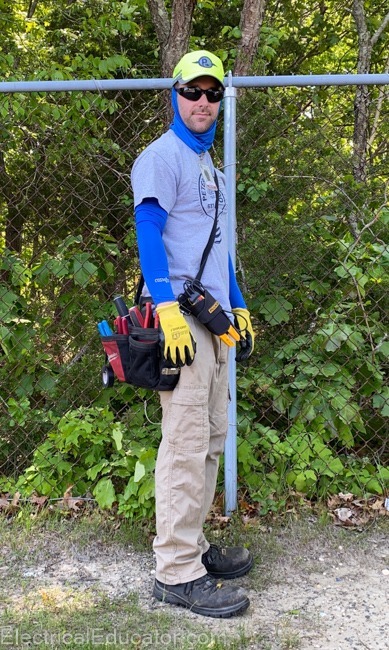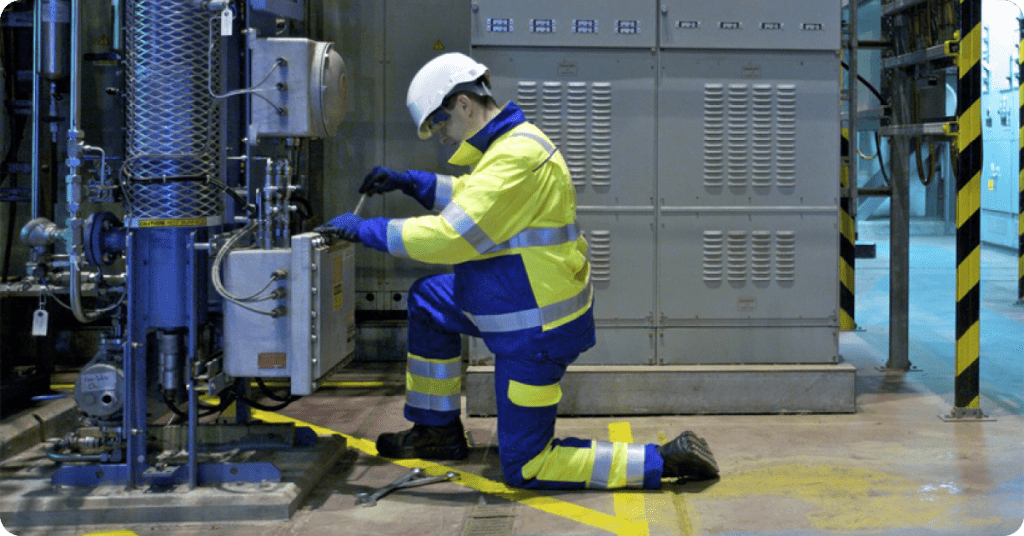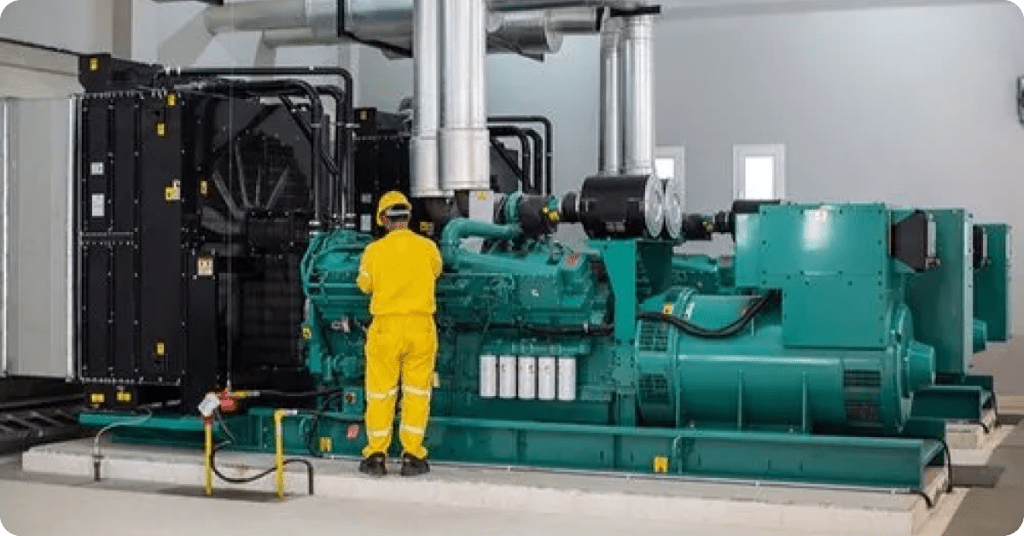Today I want to discuss the best electrician clothing and gear from my personal experience. These recommendations are from someone who actually works regularly in the field in New York where it can be over 100F in the summers and down around 0F in the winters. These are things that nobody is going to teach you in school. Most of the topics I’ll discuss aren’t even necessarily strictly “electrician clothing” but just good clothing for anyone wanting to work safely and comfortably from a weekend warrior to us electricians. For both extreme hot and cold conditions we need to be as comfortable as possible to deliver maximum results. The less I worry about being incredibly hot or freezing cold, the more thought I can dedicate to the task at hand. I’ve included some links to make your life easier.
The vast majority of electrical companies will give you some sort of uniform and dress code to follow. It typically won’t be complex consisting of something like a graphic tee or collared shirt, cap, and sweatshirt. Steel toe boots or even voltage rated boots may or may not be required and I’ll offer some suggestions there as well towards the end of this. Let’s begin.
Pants
Pants are the most overlooked article of electrician clothing that will make your life easier! Most companies don’t require or supply pants so you have some flexibility here. I used to wear jeans because that’s what everyone else wore but I found that they restricted me in a few areas. Firstly, if you’ve ever tried crouching, squatting, and crawling through a tight attic in jeans, you know that your movement is limited first by the pants, and then by your physical capabilities. Second, jeans aren’t very breathable and are usually made from a heavy weight cotton. Lastly, they usually only have 2 side pockets and 2 rear pockets, none of which are of much use.
My solution and recommendation: Light weight cargo pants. I’ve really loved wearing cargo pants, specifically the light weight ripstop version. They are inexpensive, very light weight, breathable, have a ton of pockets, and allow you to move! When I’m working in the field I usually can get away with 1-2 pairs of pants per week so I’m not washing them a ton and they will last. You’ll destroy them with tar, glue, or walking in to a sharp object before they wear out.
Carhart Ripstop Lightweight Pants: https://www.carhartt.com/product/104200/force-relaxed-fit-ripstop-cargo-work-pant
Wrangler Ripstop Lightweight Pants: https://www.wrangler.com/shop/mens-ripstop-cargo-pant-70L3.html
Here’s a life hack for those of you that work in cold and windy environments. Buy flannel lined work pants. Go a step further and buy a pair of cargo pants one size up and you can wear flannel pajama pants underneath tucked in to your socks. You might laugh at this but give it a shot and then tell me how silly it is.
Carhart Flannel Lined Pants: https://www.carhartt.com/product/103342/rugged-flex-relaxed-fit-canvas-flannel-lined-utility-work-pant
Sun Protection
If you’re working all day in the sun, especially the summer sun, you are going to want some sun protection. You could wear sun block and reapply every 4 hours or whatever it is but that’s going to get tiring and also not going to help keep the sun off of you in the first place. Don’t forget to drink bring and drink plenty of water and wear sunglasses (see more below on safety sunglasses)
My solution and recommendation: Sun sleeves, a sun hat, and a neck gaiter. I swear by this and wear these when I’m working in the field or even around the house. You’re still going to sweat but being able to keep the sun from directly hitting your skin is a tremendous advantage. This method is also easier and far less messy than sun block.

Safety Glasses
Let’s not over complicate this. You NEED to have safety glasses and I recommend wearing them at all times on the job. Unless you get some real back alley stuff, most of the safety glasses on the market are going to meet ANSI Z87.1 requirements. Make sure they do.
My solution and recommendation: Buy inexpensive safety glasses and also get UV rated safety glasses. Keep both in your tool bag. You can pick up inexpensive UV rated safety glasses that are more or less disposable so you can rotate them out every few months. Keep both pairs in a glasses case or an old sock or something to protect them in your tool bag. Safety glasses are made from plastic polymers and will scratch very easily.
These are the safety sun glasses I’ve been using: https://www.amazon.com/dp/B07XP6J9DC?ref_=cm_sw_r_cp_ud_dp_85HHQ8B4G7YRK6AT485J
Tool Bag and Tool Pouch
These are highly subjective and everyone going to have their own preference. This is something you’ll be experimenting with from your first day on the job to the day you retire. I know some people get weird about tools in general but I’m going to offer you what works well for me.
My solution and recommendation: Own a tool pouch that you keep on your person and a tool bag or box that contains the rest of your tools and leave it on the truck.
Again, personally what I wear is a tool bag that goes around my shoulder. Years ago I tore a ligament in my groin from wearing a toolbelt. The switch for me was out of necessity but I’ve grown so accustomed to it I can never go back.
I use a Klein tool bag to keep the majority of my larger tools in. I’ll post a more in depth article soon as to the exact tools I use and insert a link here.
Boots
I could write an entire article, heck a book, on work shoes and boots alone but I’ll give you the short version and explain why I consider this an invaluable part of your electrician clothing that you should spend time figuring out. You NEED to wear work boots on any job site from a residence to an industrial powerplant. Sneakers just don’t cut it and will get you hurt. Don’t become a statistic. There are many different kinds of boots with all different safety features such as steel toe, slip resistance, static dissipation, non metallic, etc. I encourage everyone to read this fantastic article: https://www.familyfootwearcenter.com/blog/astm-safety-standards-expert-guide-to-work-boot-safety/
My recommendation: Experiment with different types of work boots/shoes. Many sites don’t disclose the weight of the shoes, look in to this! Heavy boots can make your life miserable if you don’t need them. If you’re in a state with temperature swings, get a summer pair and a winter pair. Replace work boots when they become compromised.
I’ve worn everything from redwing to caterpillar, to wolverine, to timberland pro. They all have great products, you just need to find what works best for you. Unfortunately this could mean expensive, but go try some on!
Just like my other articles, I’ll refine and update this article as time goes on. Feel free to contact us if you have any questions or suggestions that I could recommend as electrician clothing to our future generation of electricians. I’m always open to hear best practices of others. I hope this was of some help, thanks for reading.



